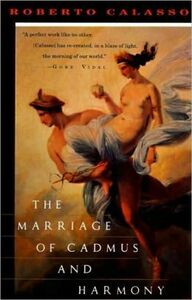Take a photo of a barcode or cover
adventurous
challenging
informative
inspiring
mysterious
reflective
medium-paced
Un libro bellissimo, capace di arricchirti più del biglietto vincente della lotteria.
L'ho centellinato fino all'ultimo eppure l'addio è arrivato troppo presto. Non volevo finirlo, ora non mi resta che recuperare le altre opere di Calasso.
L'ho centellinato fino all'ultimo eppure l'addio è arrivato troppo presto. Non volevo finirlo, ora non mi resta che recuperare le altre opere di Calasso.
“Che cosa concludere? Invitare gli dei rovina i rapporti con loro, ma mette in moto la storia. Una vita dove gli dei non sono invitati non vale la pena di essere vissuta. Sarà più tranquilla, ma senza storia. E si può pensare che quell'invito pericoloso sia ogni volta ordito dagli dei stessi, che si annoiano degli uomini che non hanno storia.”
Roberto Calasso writes mysteries into marvels of erudition and sophisticated instruction. The gods and the Greeks have never been so clear, so human to me as when I see them in Calasso. In any constellation of writers his star would shine brighter than most. Cadmus and Harmony did to me what the greatest books must do: destroyed me and left me in what I saw to be a revitalized state. The Grecian lineage of myth and signs has found few investigations equal to this one.
challenging
informative
slow-paced
Calasso makes a lot of interesting connections between various Greek myths and their different variations and presents some intriguing analyses, but unfortunately this book came off to me as though Calasso is doing the Pepe Silvia meme at the reader the whole time. Some of the claims he makes are way too conspiracy theory-feeling for my liking. At some point I felt that there were way too many threads Calasso was trying to connect and I got bored
"Na pólis, a mesquinhez jacobina era poderosa. O bem publico podia exigir as suas vitimas (...) Bastava-lhe a opinião, a opinião publica, inconstante e assassina, que todos os dias deslizava pela agorá"
"um analfabeto aproximou-se de Aristides, que nunca vira antes, e pediu-lhe para escrever o nome Aristides numa pedra. Seria o seu voto a favor do ostracismo. Aristides perguntou-lhe: que mal te fez Aristides?: o analfabeto respondeu: "Nenhum. Nem sequer conheço o homem, mas aborrece-me ouvir por toda a parte chamarem-lhe o Justo".
"um analfabeto aproximou-se de Aristides, que nunca vira antes, e pediu-lhe para escrever o nome Aristides numa pedra. Seria o seu voto a favor do ostracismo. Aristides perguntou-lhe: que mal te fez Aristides?: o analfabeto respondeu: "Nenhum. Nem sequer conheço o homem, mas aborrece-me ouvir por toda a parte chamarem-lhe o Justo".
slow-paced
very slow going, at least for me when i realized how unfamiliar i am with some myths and forgotten the finer details of a few others, but what an informative read that drones on in the best way.
reading this felt very much like a lecture with it’s many meanderings that go on and on before coming back around, interjected with some imagined fictionalizations, fitting the many multitudes and contradictions within mythical tellings. part of me thinks this will be much more scrutable to someone more versed in greek history and opheric traditions, but the larger part of me enjoyed how enchanting it can be when i can’t completely parse it. i’m very certain this is a book i’ll keep coming back to for years and years.
"Thus far the stories take us: but for every myth told, there is another, unnameable, that is not told, another which beckons from the shadows, surfacing only through allusions, fragments, coincidences, with nobody ever daring to tell all in a single story."There might be something here, but this book didn't come to me at the right time.
On Helen (of Troy), my paraphrase:
"Helen was not in troy at the time of the events of the trojan war (homer knew this (perhaps why she is never described)). Helen is in memphis in Egypt at this time." --> “The immense scandal of Homer lies first and foremost in his allowing Helen to survive the fall of Troy.” --> "According to Stesichorus and Euripides, Helen was a phantom. According to Homer, Helen was the phantom, eídōlon. The Homeric vision is by far the more thorny and frightening. Dealing with a phantom while knowing that there is a reality to counter it doesn’t involve the same kind of tension as dealing with a phantom and knowing that it is also a reality. Helen is as gold to other merchandise: gold too is merchandise, but of such a kind that it can represent all the others. The phantom, or image, is precisely that act of representation."On Athens/Sparta:
“None of the great men of the fifth century B.C. was able to live in Athens without the constant fear of being expelled from the city and condemned to death. Ostracism and the sycophants formed the two prongs of a pincer that held society tightly together. As Jacob Burckhardt was first to recognize, Jacobin pettiness became a powerful force in the pólis. But the truth is that the Spartans had come up with a very different and far more effective way of doing things. They created the image of a virtuous, law-abiding society as a powerful propaganda weapon for external consumption, while the reality inside Sparta was that they cared less for such things than anyone else. They left eloquence to the Athenians, and with a smirk on their faces too, because they knew that that eloquent, indeed talkative nation would be the first to feel nostalgic for the sober virtue of the Spartans, not appreciating that such virtue was nothing more than a useful ploy for confusing and unnerving their enemies."On Heroes/Monsters:
"Oedipus was the unhappiest of the heroes and the most vulnerable, but he was also the one who took a step beyond the other heroes. The hero’s relationship with the monster is one of contact, skin against skin. Oedipus is the first not to touch the monster. Instead he looks at it and speaks to it. Oedipus kills with words; he tosses mortal words into the air as Medea hurled her magic spells at Talos. After Oedipus’s answer, the Sphinx fell into a chasm. Oedipus didn’t climb down there to skin it, to get those colorful scales that allured travelers like the rich clothes of some Oriental courtesan. Oedipus is the first to feel he can do without contact with the monster. Of all his crimes, the most serious is the one no one reproaches him with: his not having touched the monster. Oedipus goes blind and becomes a beggar because he doesn’t have a Gorgon on his chest to defend him, doesn’t have the skin of a wild beast over his shoulders, doesn’t have a talisman to clutch in his hand. Words grant him a victory that is too clean, that leaves no spoils. And it is precisely in the spoils that power resides. The word may win where every other weapon fails. But it remains naked and solitary after its victory."Misc:
“I alone among the gods have the keys to the room where the lightning is sealed.” (I am always mis-attributing this to Job)
“Atreus eyes.”
I started this awhile ago but put it down when I got busy reading other things. Now I'll finish it. Maybe it will be more compelling this time.
adventurous
challenging
informative
medium-paced
Plot or Character Driven:
A mix
Strong character development:
Complicated
Loveable characters:
Yes
Diverse cast of characters:
Yes
Flaws of characters a main focus:
Yes






